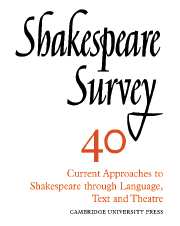Book contents
- Frontmatter
- Reconstructing Shakespeare, or Harlotry in Bardolatry
- Playing Shakespeare
- Take me to your Leda
- Sign Theory and Shakespeare
- Time in Richard III
- New Concepts of Staging A Midsummer Night’s Dream
- Henry V as Working-House of Ideology
- Shakespeare and his Sources: Observations on the Critical History of Julius Caesar
- The Speculative Eye: Problematic Self-Knowledge in Julius Caesar
- Learning by Talking: Conversation in As You Like It
- Measure for Measure: Mirror for Mirror
- Allegory and Irony in Othello
- Cruelty, King Lear and the South African Land Act 1913
- The Rationale of Current Bibliographical Methods: Printing House Studies, Computer-Aided Compositor Studies, and the Use of Statistical Methods
- Shakespeare’s Late Plays at Stratford, Ontario
- Shakespeare Performances in London, Manchester and Stratford-upon-Avon 1985–6
- The Year's Contributions to Shakespearian Study 1 Critical Studies
- 2 Shakespeare’s Life, Times, and Stage
- 3 Editions and Textual Studies
- Index
The Year's Contributions to Shakespearian Study 1 - Critical Studies
Published online by Cambridge University Press: 28 March 2007
- Frontmatter
- Reconstructing Shakespeare, or Harlotry in Bardolatry
- Playing Shakespeare
- Take me to your Leda
- Sign Theory and Shakespeare
- Time in Richard III
- New Concepts of Staging A Midsummer Night’s Dream
- Henry V as Working-House of Ideology
- Shakespeare and his Sources: Observations on the Critical History of Julius Caesar
- The Speculative Eye: Problematic Self-Knowledge in Julius Caesar
- Learning by Talking: Conversation in As You Like It
- Measure for Measure: Mirror for Mirror
- Allegory and Irony in Othello
- Cruelty, King Lear and the South African Land Act 1913
- The Rationale of Current Bibliographical Methods: Printing House Studies, Computer-Aided Compositor Studies, and the Use of Statistical Methods
- Shakespeare’s Late Plays at Stratford, Ontario
- Shakespeare Performances in London, Manchester and Stratford-upon-Avon 1985–6
- The Year's Contributions to Shakespearian Study 1 Critical Studies
- 2 Shakespeare’s Life, Times, and Stage
- 3 Editions and Textual Studies
- Index
Summary
ALTERNATIVES
'Shakespeare' is being thoroughly overhauled as more critics come to practise recent theoretical approaches. His (its?) status as a national institution is being systematically scrutinized by structuralists, deconstructionists, Marxists, and feminists, and there are enough books in this field this year, for the first time, for us to assess their contribution as a whole. No longer can we assume that Shakespeare speaks from an innate grasp of 'the human condition', and we are advised to examine coolly the texts, and critics of other persuasions, for their underlying structures and value systems. Meanwhile, and somewhat ironically, the Chinese have chosen 1986 to reinstate Shakespeare as part of their own cultural heritage, with large festivals in his honour in Beijing and Shanghai.
Terence Hawkes's subject in That Shakespehearian Rag: Essays on a Critical Process is, as the title implies, not Shakespeare directly but his critics. An examination of the critical statements of some influential critics of this century such as Raleigh (mainly the twentieth-century one, though his earlier namesake makes some entertaining appearances), Bradley, Eliot, and Dover Wilson, demonstrates the appropriation of Shakespeare to particular causes and educational policies which require close examination.
- Type
- Chapter
- Information
- Shakespeare Survey , pp. 185 - 211Publisher: Cambridge University PressPrint publication year: 1988

